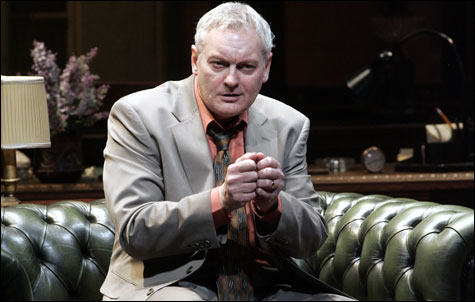Shining City at the Huntington; ASP’s The Tempest
By CAROLYN CLAY | March 18, 2008

SHINING CITY: McPherson’s therapy play brings new meaning to the term “transference.” |
The cupboards of Irish dramaturgy are crammed with ghosts. And in the larder of Conor McPherson, ectoplasm crowds even Jameson’s off the shelf. In the 36-year-old McPherson’s Olivier Award–winning The Weir, a gaggle of men shoot the supernatural shit in a rural Irish bar — until a visiting young woman’s poignant account of her own telephonic trafficking with the dead knocks them off their pins. St. Nicholas conjures up vampires in suburban London, and The Seafarer, currently running on Broadway, brings Beelzebub himself to a pickled poker game. The Tony-nominated Shining City, making its Boston debut in a joint production by Chicago’s Goodman Theatre and the Huntington Theatre Company (at the Boston University Theatre through April 6), hinges on a man who sees dead people. Well, one in particular: his recently deceased wife, whose demon he seeks to exorcise in a therapist’s office. Shining City is for most of its 90 minutes a subtle and compassionate work about rootlessness and disconnection, with a twist at the end that brings new meaning to the term “transference.” Whether you consider this coup de théâtre the apogee or the ruination of the play will probably determine your opinion of it. For me, it puts a knick in the integrity of the piece but cannot knock the polish off the pained and self-depreciating tale told by insomniac patient John or the beautifully acted production at the Huntington directed by Goodman honcho Robert Falls, who also helmed the 2006 Broadway staging.
Shining City was the first play McPherson wrote after his pancreas ruptured on an opening night in 2001, sending him to hospital, Alcoholics Anonymous, and therapy. Much of what he gleaned from the last can be summed up in the shrink’s equivalent of “Physician, heal thyself.” As McPherson has observed, you don’t go into psychotherapy — or, perhaps, playwriting — without a certain attraction to dysfunction. In this case, therapist Ian is no Sigmund Freud or even Dr. Phil. A lapsed priest, he has been supported through a “course” in psychotherapy by a young woman who has recently borne his child — and from whom he is endeavoring to escape, leaving her and the baby in a borrowed lair at his brother’s house while he sleeps in the dingy Dublin office where he has just set up shop. The troubled John, who is coming apart too rapidly to have waited weeks to see a more qualified therapist, may be his only client. The business of the play lies in how the reticent Ian is influenced by the garrulous John’s revelations of marital dissatisfaction, guilt, and aborted adultery. In brief scenes with the girlfriend and then with the most hangdog hustler in history that are interspersed with Ian’s three encounters with John, the therapist’s actions seem to have been pricked by his client’s experience.
 Topics
Topics:
Theater
, Entertainment, Science and Technology, Marianna Bassham, More  , Entertainment, Science and Technology, Marianna Bassham, Patrick Swanson, Benjamin Evett, Brian Dennehy, Edward Scissorhands, Gene Clark, Jason Bowen, John Kuntz, Less
, Entertainment, Science and Technology, Marianna Bassham, Patrick Swanson, Benjamin Evett, Brian Dennehy, Edward Scissorhands, Gene Clark, Jason Bowen, John Kuntz, Less 